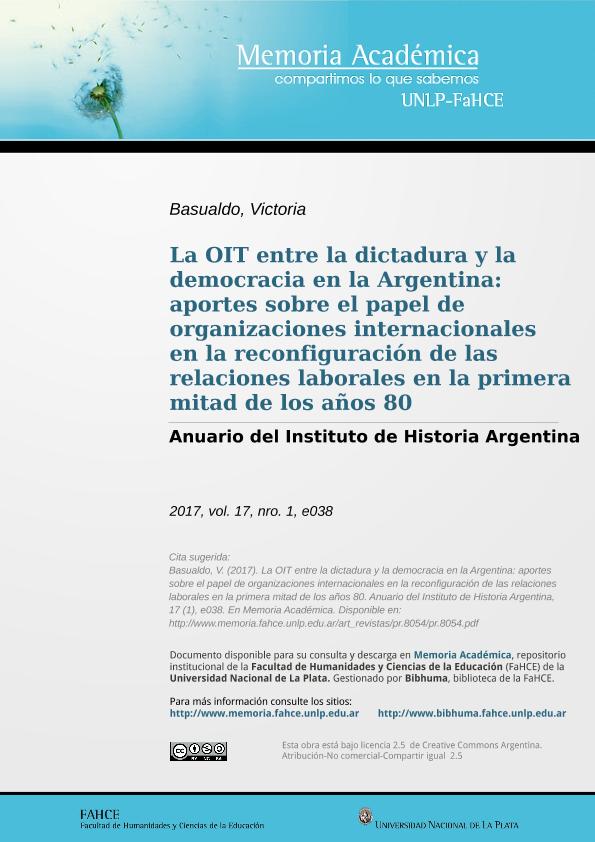Artículo
Este artículo tiene como objetivo analizar el papel de la Organización Internacional del Trabajo (OIT) en los años de la última dictadura en Argentina (1976-1983) y en los comienzos del gobierno democrático (1983-1985), promoviendo la investigación en mayor profundidad de la incidencia y participación de las organizaciones sindicales internacionales en la reconfiguración de las relaciones laborales y sindicales en esos años. En la primera parte se analizan algunas de las intervenciones de la OIT durante la dictadura entre 1976 y 1983, prestando particular atención a la importancia tanto del caso 842 presentado ante el Comité de Libertad Sindical, como de las conferencias anuales y diversas formas de interacción con esta organización en dicha etapa. En la segunda parte, el trabajo aborda el papel de esta organización en el contexto argentino durante los dos primeros años de la transición a la democracia (1983-1985). Aunque existen valiosos aportes sobre los intentos de replantear el funcionamiento de las organizaciones sindicales en esos años, la participación de la OIT y de otras organizaciones internacionales en las definiciones y políticas respecto al movimiento sindical está relativamente poco abordada, a pesar de ser relevante. Al mismo tiempo, el análisis de las relaciones sindicales en cada uno de estos períodos ha tendido a llevarse adelante separadamente, y proponemos aquí que ponerlos en diálogo podría abrir líneas interesantes de análisis. En el apartado final se presentan algunas conclusiones y sobre todo posibles líneas de investigación hacia adelante. This article aims at analyzing the role of the ILO from the last dictatorship (1976-1983) to the initial years of the ensuing democratic government (1983-1985), as a step towards further and deeper research on the role of international labor organizations in the reconfiguration of labor relations in the 1980s. First, it focuses on particularly relevant dimensions of the ILO action during the dictatorship, paying special attention to the case 842 of the Committee of Freedom of Association concerning the violation of labor rights in Argentina, and the yearly conferences in Geneva as well as other relevant forms of interaction. Second, the paper analyzes the role of this organization during the first two years of the democratic government (1983-1985), based on newly available archival sources as well as coverage by the national press. Even though there are valuable contributions about the topic, few of them focus specifically on the role of international labor organizations and the influence on the definition of State policies towards the trade-union movement and the working class. This section analyzes some of the main governmental projects for the labor movement, particularly the so-called Mucci Law, a project of trade-union reorganization, some of the ways in which the international labor organizations participated in the public debate and discussions about it, the impact of the defeat of this governmental project in Congress and the ways in which connections and contacts with the ILO continued ahead. In terms of the conclusions of this paper, it is significant to notice that although there had been during 1976-1983 an accumulation of evidence and analysis about the evolution of the labor movement and labor conditions in Argentina at different ILO offices, the ILO officials do not seem to have taken advantage of these valuable resources from 1983 to 1985 to face the challenges and puzzles in the initial times of the new democratic government. A second conclusion is that during these years the ILO officials seem to have consolidated their connections with some of the most conservative sectors of the Argentine labor movement that increased their influence and power from that moment onwards.
La OIT entre la dictadura y la democracia en la Argentina: aportes sobre el papel de organizaciones internacionales en la reconfiguración de las relaciones laborales en la primera mitad de los años 80
Título:
The ILO from dictatorship to democracy in Argentina: contributions about the role of international organizations in the process of reconfiguration of labor relations during the first half of the 1980s
Fecha de publicación:
06/2017
Editorial:
Universidad Nacional de La Plata. Facultad de Humanidades y Ciencias de la Educación
Revista:
Anuario del Instituto de Historia Argentina
ISSN:
2314-257X
Idioma:
Español
Tipo de recurso:
Artículo publicado
Clasificación temática:
Resumen
Palabras clave:
Sindicalismo Internacional
,
Dictadura
,
Oit
,
Relaciones Internacionales
Archivos asociados
Licencia
Identificadores
Colecciones
Articulos(SEDE CENTRAL)
Articulos de SEDE CENTRAL
Articulos de SEDE CENTRAL
Citación
Basualdo, Victoria; La OIT entre la dictadura y la democracia en la Argentina: aportes sobre el papel de organizaciones internacionales en la reconfiguración de las relaciones laborales en la primera mitad de los años 80
; Universidad Nacional de La Plata. Facultad de Humanidades y Ciencias de la Educación; Anuario del Instituto de Historia Argentina; 17; 1; 6-2017; 1-18
Compartir
Altmétricas




